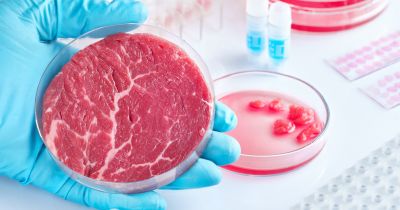
We’re a week into this year’s UN climate summit, COP27, and the various agenda planned to roll out on the back of it are coming into focus.
None more so than the autumn offensive in the establishment’s war on food. There’s a big push on that front.
Today was “Adaptation and Agriculture” day at COP27, and you probably don’t need me to tell you what was on the agenda – a lot of talk of “sustainability”, “innovation”, “climate-friendly production” and so on.
As usual with these global meetings, the closed-door discussions and po-faced newspeak presentations are accompanied by a wave of synchronized propaganda.
One angle this propaganda is taking is that COP27 “refused to discuss” meat or farming in general, and therefore those people insisting we should kill all the cows in the world and eat lab-grown paste instead are somehow rebels speaking truth to power.
That’s how George Monbiot is arranging the narrative for his piece in the Guardian.
It’s nonsense, of course. COP27 literally had an entire day dedicated to discussing farming, “food security” and “innovations” to “reduce methane” (that’s code for “getting rid of cows” by the way).
Further, COP27 is being used to launch the UN’s new Food and Agriculture for Sustainable Transformation (FAST) initiative. Which, according to Forbes, will promote:
[A] shift towards sustainable, climate-resilient, healthy diets would help reduce health and climate change costs by up to US$ 1.3 trillion while supporting food security in the face of climate change.
As well as the AIM initiative, which intends to channel 8 BILLION dollars into “farming innovations”.
But, in another example of the fake binary, while COP27 members were inside discussing “adapting agriculture”, “protestors” were outside demanding they discuss adapting agriculture.
The protesters even used the platform to announce the launch of a new campaign “Reboot Food” which assures us that all we need to feed the world is giant nuclear-powered fermenting vats:
The cornerstone idea is swapping animal agriculture, where possible, for a technology called precision fermentation, which would involve brewing yeasts and bacteria to make protein. It could create biologically identical animal proteins using genetically engineered micro-organisms fermented in tanks. These factories would be powered by solar, wind and nuclear.
That’s just the broadest most ambitious “food reform” propaganda coming out in the last few days though, there’s a lot more where that came from.
Earlier this week it was announced that synthetic meat company GoodMeat would be unveiling their new lab-grown meat products at the COP27 summit.
On a similar theme, EuroNews asks:
Companies are making slaughter-free meat – so why isn’t it for sale in shops?
It’s not just lab-grown meat or nuclear-powered yeast paste hitting the headlines either, edible insect stories are suddenly all over the news again.
The I has a piece from a “journalist” who didn’t like the idea of eating insects, but then tried it for a week and found out it was actually great.
The academic journal PNAS published an article unsubtly titled “How to convince people to eat insects”, which suggests we need to “create a new norm”.
Healthline News has an article “What Science Says About Eating Insects”. Spoiler alert – “science” says that eating insects is great and everybody should do it as much as possible. Who knew, right?
At the same time, the UK’s Food Standards Agency published a startingly well-timed report on the safety of edible insects (turns out they’re safe, shocking isn’t it?)
But the prize of the clumsiest propaganda of the week goes to the Independent, which boasts an article with the headline:
Eww world order: How the right-wing became obsessed with eating bugs
This opens with a screed about how lunatic right-wing conspiracy theorists think we’re all being programmed to eat insects…and then seamlessly blends into half-a-dozen paragraphs about how eating insects is actually really good for you though, and good for the planet too:
The reality is that there are a multitude of good reasons to eat insect protein, not least the environmental impact. Breeding insects such as crickets and grasshoppers requires less feed, land and water than farming traditional livestock like pigs and cows, and results in the production of much less greenhouse gas.
Great job guys, real smooth.
UN summits – especially climate summits – always provide a little sneak preview of the upcoming narratives. And while “food reform” may not be the only, or even the biggest, item on the agenda…it’s definitely a major part of the plan. And it’s probably coming soon.